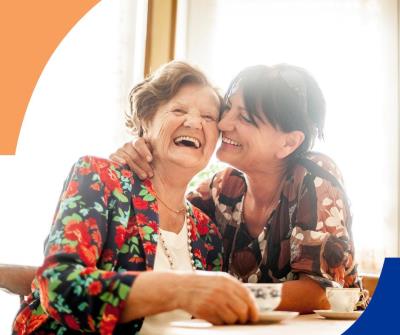Alzheimer's Awareness Month: Seven Tips For Caregivers
Posted June 20, 2018 by Natalie Kayani, MD

Updated September 2024
In 2024, there are currently 6.9 million Americans 65 and older living with Alzheimer's disease. Every 65 seconds, someone in the US develops this disease. It is the most common form of dementia and affects women at almost double the rate of men. Dementia diseases relate to the brain’s ability to regulate memory and cognitive skills. Other forms of dementia include Parkinson’s and Huntington's disease and vascular dementia, dementia with Lewy bodies and mixed dementia.
Alzheimer’s disease can be stressful, debilitating and challenging for patients but can also significantly affect the lives of the patient’s family and primary caregiver. Below are a few tips to help mitigate the challenges associated with caring for someone with this disease:
- Develop easy routines and reduce frustrations. One of the biggest challenges in the beginning stages of Alzheimer's is figuring out how much assistance to give and when. This is where it is helpful to begin easy routines. Try to eat meals around the same time every day. If you can determine what time of day your loved one is most alert, plan the majority of activities or decision-making tasks at that time. For example, if you know that planning what to eat can become frustrating by the middle of the week, ask for help in preparing a grocery list and food prep early in the week. Always assume your loved one can make decisions on their own. Only offer suggestions or help once it appears the task is turning stressful. A routine is great but always allow some flexibility for difficult days.
- Safeguard the living space. Consider the same steps new parents make when baby-proofing their home. You want to prevent accidents like slips, falls and the use of harmful chemicals.
- Prepare and plan for a “wandering” incident. Six in 10 people with dementia will wander away. When this happens, a person may not remember their address, phone number or even their own name. When proofing the living space, consider devices that can alert you when a door or window has been opened. Keep a current photo and contact information with you and in bags, purses and wallets that are easily accessible. Have a list of phone numbers ready and inform all your neighbors and friends to alert you should they see your loved one out alone. Spend no more than 15 minutes looking outside before calling 911 and alert them your missing person has Alzheimer’s and is a “vulnerable adult.”
- Maintain regular activities the person enjoys. If your loved one enjoys crafting, keep simple project materials around. Or if they play an instrument, keep those within eyesight.
- Keep things simple yet engaging. Keeping the brain stimulated and active is a big resource in the fight against this disease. To mitigate frustrations and mood changes, keep things simple but still ask questions, preferences and opinions on ideas. For example, give two clothing options and ask for their opinion. Or provide two outdoor activities you could do together and let them pick.
- Evaluate your emotions and expectations. It goes without saying that this will be stressful at times. It is important to check in and evaluate your mental health as well. Find a support group. There are a variety of reasons to do this but the most important is to find people to share your experiences, frustrations and tips (or failures) with.
- Know when it is time to explore additional care options. The last stage of Alzheimer’s can last from several weeks to years. As it progresses, symptoms can drastically affect a patient’s quality of life. Patients can require 24-hour care and help with eating, walking and personal care. They can also be extremely vulnerable to infections, like pneumonia. This care can sometimes exceed what can be provided at home. Though this decision is often the most difficult one, knowing your resources and options gives you the best opportunity at providing your loved one with the care they need.
Caring for an older adult or someone with complex medical needs is hard work. Summa Health System is proud to assist with the resources and medical services your loved ones may need with one of the largest teams of geriatricians and senior healthcare specialists in Northeast Ohio. To make an appointment, call 330.375.4100.
About the Author
Vitality eNews Sign Up
Receive the Summa Health eNewsletter for the latest health tips, advice and updates.

